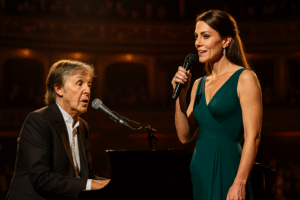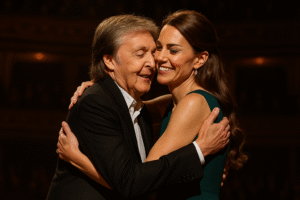No one expected what happened that night. Not even the most seasoned royal watchers, not even the stars backstage. On June 18, 2025, the Royal Albert Hall glittered with history and celebrity as the Prince’s Trust celebrated its 50th anniversary. The stage had already been blessed by the powerhouse vocals of Adele, the poetic charm of Ed Sheeran, the soulful echoes of Sam Smith, and—just when the crowd thought they’d seen it all—a surprise reunion from Coldplay. The atmosphere was electric.

Then, without announcement, the lights dimmed once more.
The crowd leaned forward. You could hear a pin drop. No music, no voice, just anticipation hanging heavy in the air.
A single spotlight.
Sir Paul McCartney stepped onto the stage with nothing but his acoustic guitar and that knowing, quiet smile. He didn’t speak. He simply started to play the whimsical first chords of “Her Majesty”—a song once meant as a hidden joke, now reimagined as something far more reverent. It was a choice that made the audience stir. A royal song, from a Beatle, at a royal gala.

But before they could digest it, it happened.
From the side of the stage, she appeared.
Catherine, Princess of Wales.
Wearing an elegant ivory gown, soft as moonlight, and around her neck—the unmistakable sapphire pendant once worn by Princess Diana. She didn’t wave. She didn’t smile. She simply walked to Paul’s side, her eyes cast gently toward him, then to the crowd.
And then, she sang.
Not like a pop star. Not like a polished performer. Her voice was light, uncertain, and trembling—but filled with emotion so raw, it silenced the breath of thousands. There was something hauntingly beautiful about hearing a future queen sing a song about Her Majesty, written in jest, now delivered in tribute.
Paul watched her with reverence, his fingers dancing across the strings, guiding her like a lighthouse through the fog. It was clear this wasn’t rehearsed to perfection—it was lived. Felt. Real.
For a brief moment, time folded. Diana’s memory hovered. Paul’s gentle strumming mirrored the comfort he once offered her. And here was Kate, standing in that same light, not just carrying the crown—but its story, its grief, its resilience.
When the song ended, they didn’t bow. They didn’t speak. Kate simply placed a hand on Paul’s shoulder. He nodded.
And they left the stage.
It was over in minutes—but no one moved. No one clapped, at first. Then a single applause. Then waves of it. Then tears.
Because that night wasn’t about spectacle. It wasn’t about royalty or music or fame.
It was about inheritance.
Not of jewels or titles—but of pain, of grace, and of a quiet, enduring strength.
And in that sacred silence between chords and courage, Princess Kate didn’t just sing a song.
She became the legacy.